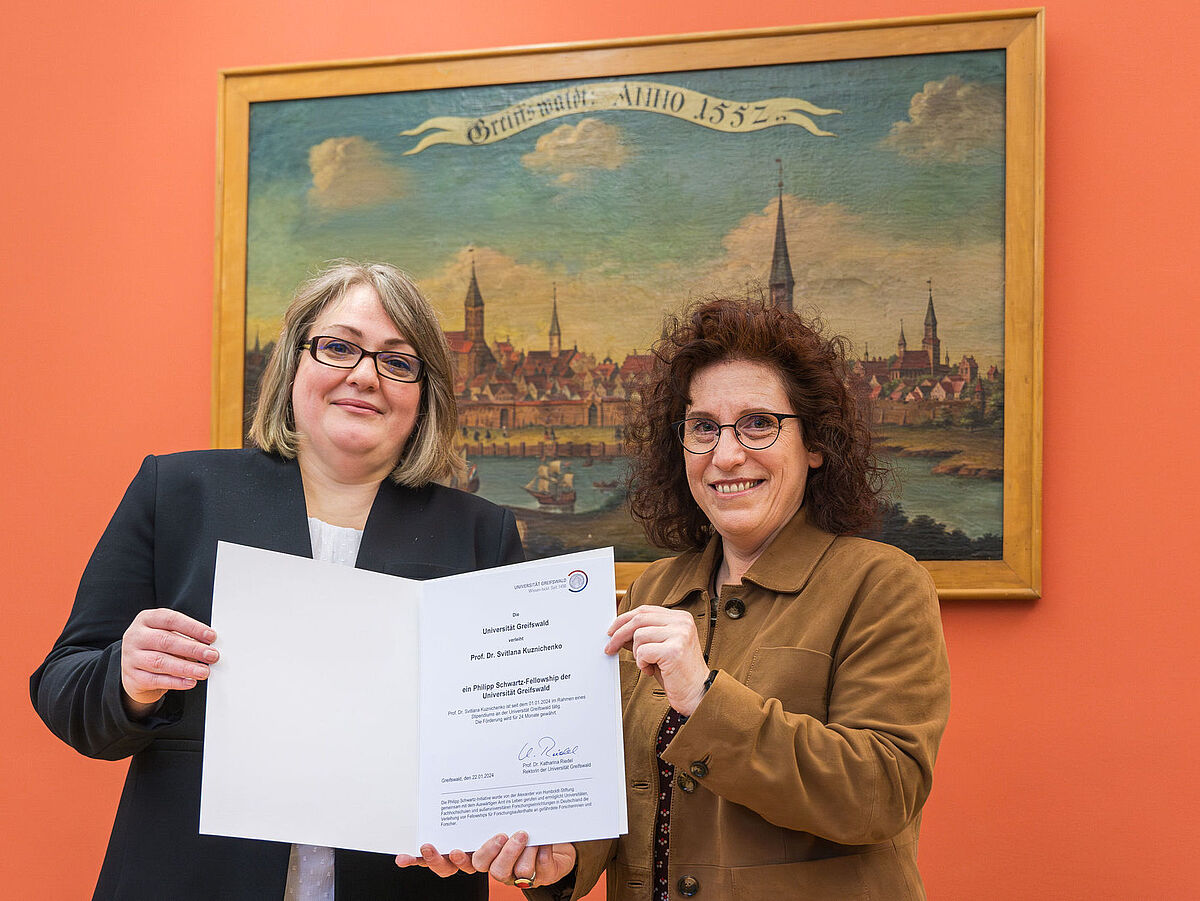Philipp Schwartz Research Fellowship Awarded to Prof. Svitlana Kuznichenko

A Philipp Schwartz Fellowship has been awarded to Ukrainian scholar, Prof. Svitlana Kuznichenko. The Rector of the University of Greifswald, Prof. Dr. Katharina Riedel, presented the certificate to Prof. Kuznichenko at an award ceremony on Monday 22 January 2024. The fellowship enables Prof. Kuznichenko to conduct a 24-month research project “Towards an Innovative Methodology for Land Degradation Risk Assessment in Ukraine” at the Institute for Geography and Geology’s Earth Observation and Geoinformation Science Lab. The Philipp Schwartz Initiative was launched by the Alexander von Humboldt Foundation and the Federal Foreign Office in 2015.
Svitlana Kuznichenko is a professor at the Odesa State Environmental University (OSENU) in Ukraine. Prior to leaving Odesa in May 2022, she held the position of the Dean of the Faculty of Computer Science, Management and Administration at OSENU. She has extensive experience in the field of geoinformation science (GIS) and has been involved in several international as well as national projects related to environmental conservation and ecological safety throughout her scientific career. Her research interests encompass geospatial modeling and environmental monitoring with geodata and satellite imagery. Prof. Kuznichenko particularly focuses on integrating multi-criteria decision-making approaches into GIS and on analysing geo-environmental risks. Her new research project is dedicated to developing an approach for assessing the risk of soil degradation in Ukraine, considering the influence of military-technogenic factors.
Between August 2022 and December 2023 Prof. Kuznichenko participated in the OPENSPACES project at the University of Greifswald’s Institute of Geography and Geology and the Interdisciplinary Centre for Baltic Sea Region Research (IFZO). The project was funded by the German Academic Exchange Service (DAAD) as part of the Ukraine Digital programme to support teaching at universities in Ukraine during the ongoing war.
On receiving the award, Prof. Kuznichenko expressed her gratitude to the academic community at the University of Greifswald: “It is a great honour for me to remain part of this vibrant research environment for the next two years. The privilege and the opportunity to work on a new project, granted to me through the Alexander von Humboldt Foundation’s Philipp Schwartz Fellowship, would have been impossible without the unparalleled support and trust I have received at the University of Greifswald. I hope that my research will not only yield practical results beneficial for Ukraine but also contribute to strengthening our scientific ties, peace, and mutual understanding.” Prof. Sebastian van der Linden, head of the Earth Observation and Geoinformation Science Lab and mentor of the Philip Schwartz fellow, deemed the research project “highly relevant and, given the extensive degradation caused by military actions, urgently needed in order to build the scientific basis for organising the safe recommencement of agricultural production in Ukraine.”
Prof. Kuznichenko is the third researcher to be granted a Philipp Schwartz Fellowship for a project at the University of Greifswald; previous fellows were from Belarus and Ukraine. For the Rector, Prof. Riedel, the award of the fellowship symbolises the efforts being made by the University of Greifswald to support Ukrainian academics through successful applications to various funding bodies, including the DAAD and the EU’s MSCA4Ukraine programme. Moreover, she stressed “the University is committed to supporting researchers at risk, regardless of their place of origin, and in a broader context to defending academic freedom and democracy”.
The University of Greifswald became a member of Scholars at Risk (SAR) network in 2021 with an aim of making a substantial, local contribution in Greifswald and the surrounding region to support researchers at risk, regardless of their origin. SAR is a network of over 500 academic institutions from all over the world that work together to protect and support threatened scholars and to promote academic freedom.
The Philipp Schwartz Initiative was launched by the Alexander von Humboldt Foundation together with the German Federal Foreign Office. It enables universities, universities of applied sciences, and independent research institutions to grant threatened researchers fellowships for research stays in Germany. More than 450 scientists and scholars have been accepted as fellows at German research institutions through the Philipp Schwartz Initiative since 2015.
Further Information
The photo is available on request from pressestelle@uni-greifswald.de and can be used for free for editorial purposes in combination with this media release. In the event of publication, the name of the photographer must be mentioned.
Contacts at the University of Greifswald
Dr. Hasmik Hunanyan
Head of the International Office
Domstraße 8, 17489 Greifswald
Tel.: +49 3834 420 1117
hasmik.hunanyan@uni-greifswald.de
www.uni-greifswald.de/en/international
Prof. Dr. Sebastian van der Linden
Head of the Earth Observation and Geoinformation Science Lab
Institute of Geography and Geology
Tel.: +49 3834 420 4500
sebastian.linden@uni-greifswald.de
